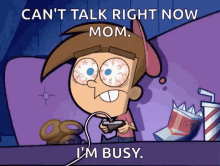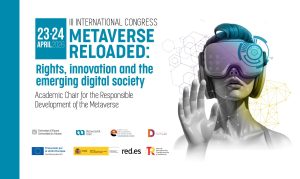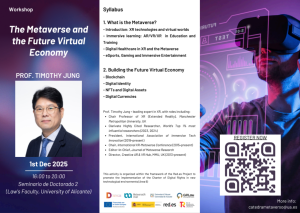
The MetaverseUA Chair Newsletter #13 – November 2024
Hey there, Metaversian friends!

Your favorite newsletter is back! We know, you missed us. In the meantime, a few things have changed in the world: summer is over, the President of the United States has changed, and the first of the the MetaverseUA Chair Research Papers’ series has been published (read it here). One thing hasn’t changed: our passion for keeping you updated on the latest in tech and sparking a few thoughts along the way. So, let’s dive in!
 Us elections: AI and Donald Trump
Us elections: AI and Donald Trump
Last Wednesday morning, many of us woke up and, before giving our good morning kiss to our better half, before taking our dog out for a walk, before having our coffee, we opened the news. Tuesday was election day in the US, and the result is well-known to all: Donald Trump will be the 47th President of the USA. But for us, tech enthusiasts, what does it mean?
There are two crucial themes of Trump’s new election that particularly interest us: artificial intelligence policies and commercial and political relations with China.
Donald Trump’s intent is to repeal President Joe Biden’s executive order on artificial intelligence (AI), aligning with the Republican platform that argues the order stifles AI innovation. Biden’s order emphasised AI safety, responsible development, and protection against biases in AI outputs, but Trump’s proposed approach would reduce regulatory oversight, favouring voluntary self-regulation by tech companies.
Experts express concern over this shift, highlighting the risks of AI systems that could exacerbate privacy and safety issues, particularly through biassed algorithms.
In the meanwhile, the EU is looking with attention. The «Brussels effect» that was hoped for may not produce the desired effects. Furthermore, this was not only Trump’s win, but also Musk’s. The billionaire founder of Tesla and SpaceX has invested heavily in the Republican candidate. He was one of the main supporters, able to move millions of dollars and votes. Since the victory, Musk has emerged as enriched and more powerful. This is certainly not good news even for his eternal rival Zuckerberg. Meanwhile, the EU and Zuckerberg and many others are on high alert.
Between these “others” is included China. During his previous term, President Trump targeted China with a series of tariffs and stringent competitive policies. This approach significantly impacted Chinese companies operating in the U.S., including TikTok. In 2020, the Trump administration attempted to ban TikTok, citing national security concerns over data privacy and potential influence from the Chinese government. Although the ban was not fully implemented, it led to increased scrutiny and regulatory challenges for the platform. The recent election of President Trump has reignited discussions about the future of TikTok in the U.S., with potential implications for its operations and user base.
Anyway, this potential US ban doesn’t seem to be slowing TikTok down. The Information reports that TikTok’s parent company ByteDance grew its overall revenue to $73 billion in the first half of 2024 — just shy of Meta’s $75.5 billion. The share of ByteDance’s revenue that comes from TikTok grew to 23 percent, meaning its operations outside of China are increasingly important for the company’s bottom line.
In the meanwhile, the addictive video-sharing app, has found itself in hot water once again, but not in the USA. This time in France.

 TikTok and the Tragic Case of a French Family: Legal Responsibility and Platform Accountability
TikTok and the Tragic Case of a French Family: Legal Responsibility and Platform Accountability
The Chinese platform is facing problems and critics in Europe. In France, precisely, a family recently filed a lawsuit against TikTok, claiming the platform’s algorithm promoted harmful content, including self-harm videos, which allegedly led their teenage daughter to attempt suicide.
This heartbreaking case brings to light TikTok’s role in shaping young users’ experiences and, unfortunately, its impact on mental health.
This time, it’s facing a lawsuit from seven French families who claim the platform’s algorithm pushed their kids towards dark and dangerous content, leading to devastating consequences.
The heart of the issue lies in TikTok’s recommendation system, designed to keep users scrolling endlessly. While this can be entertaining, it can also lead to dangerous situations. In the case of these French families, the algorithm allegedly exposed their children to content promoting self-harm, eating disorders, and, unfortunately, suicide.
Two teenagers tragically lost their lives as a result of this exposure. This isn’t just a one-off incident. Similar cases have emerged worldwide, highlighting the potential dangers of social media. Remember the Molly Russell case in the UK? It’s a similar situation as this young girl took her own life after being exposed to harmful content on Instagram and Pinterest.
The lawsuit against TikTok could set a significant legal precedent, forcing the platform to take greater responsibility for the content it serves. It’s a wake-up call for all social media companies to prioritize user safety over profits.
While TikTok has implemented some measures to protect users, critics argue that these efforts are not enough. The platform’s algorithm, which is constantly learning and adapting, can still lead to harmful content being recommended.
This case raises important questions about the role of technology in our lives. As social media continues to evolve, it’s crucial to strike a balance between innovation and user safety.
It’s time for social media platforms to be held accountable for the impact they have on our society, especially on young people. Furthermore, the time to regulate and control the social network’s algorithms is probably arrived.

 Australia vs. Social Media: The Ultimate Showdown
Australia vs. Social Media: The Ultimate Showdown

News of young people harmed by social networks comes from all over the world and spares no country. For the first time, however, a government has decided to take active steps to tackle this issue.
We are talking about Australia, that is coming in hot with what might just be the boldest move in the world of social media control. Prime Minister Anthony Albanese has declared war on underage scrolling, announcing a «world-leading» ban on kids under 16 using social media. Yep, you heard that right—no TikTok, no Instagram, no Snapchat streaks for the Aussie teens. Cue the collective gasp of Gen Z!
So, What’s the Deal?
The plan is simple: if you’re under 16, social media is officially off-limits. No exceptions. Not even if your parents give you the green light or if you already have an account with a zillion followers. Australia is even trialling some high-tech age verification systems, like biometrics and government IDs, to keep the kiddos out. If you’re wondering how that’s gonna work, you’re not alone. But one thing’s for sure—the social media giants like Meta, TikTok, and YouTube are gonna have their hands full.
Why the Drastic Measures?
Albanese isn’t holding back on the reasons: social media is messing with kids’ mental and physical health. He’s pointing to harmful body image content aimed at girls and toxic, misogynistic messages targeting boys. And honestly? From what we’re seeing, they might not be entirely wrong.
Bold move, but it raises a big question. Is this the digital detox the world’s teens need, or is it just setting up a game of cat-and-mouse between kids and tech companies? Whatever happens, Australia’s taking a stand, and the rest of the world will be watching closely. So, grab your popcorn (and maybe your government ID), because this is about to get interesting.

 Meta’s Metaverse Takeover: Kids Are Running the Show
Meta’s Metaverse Takeover: Kids Are Running the Show

Except in the case of Trump, who’s definitely not a youngster, the stars of today’s newsletter are the youth! They’re not only at the heart of our monthly roundup but also of the metaverse!
Originally, the metaverse was supposed to be a cutting-edge hangout for tech-savvy adults—a sleek, futuristic digital utopia. But guess what? The kids crashed the party, and they’re not leaving. Horizon Worlds, Meta’s VR playground, has been overrun by swarms of preteens armed with bubble guns, high-pitched shrieks, and enough meme-level energy to put TikTok to shame.
What’s going on? Well, Meta recently lowered the age limit to just 10 years old in some regions, paired with the release of super-affordable VR headsets. So, apparently, the metaverse isn’t just for crypto bros and tech geeks; it’s a neon jungle gym where kids rule the digital roost.
Pop in for five minutes, and you’ll witness a VR “Lord of the Flies.” Kids are running wild—tossing virtual dodgeballs, recreating playground games, and screaming at everyone. Adults hoping for a serene VR escape? They’re left dodging chaos or muting the cacophony.
Ironically, this youth invasion might be Horizon’s saving grace. Before the kids arrived, the platform was a ghost town. Now? It’s alive, buzzing, and … slightly terrifying. Sure, it’s not as polished as Roblox or Fortnite, but kids are creative explorers. To them, Horizon is a frontier, an unregulated virtual “woods” where they can build, play, and occasionally get into trouble.
But it’s not all sunshine and Minecraft blocks. There are legitimate concerns about safety and inappropriate interactions—issues Meta is scrambling to address with parental controls and moderators. Still, the platform sometimes feels more “Lord of the Memes” than a safe space.
So, should adults reclaim the metaverse? Or should we hand over the digital keys and let the next generation create their pixelated paradise? Whatever happens, one thing’s clear: the kids aren’t just all right—they’re everywhere.
Hope you’re ready to explore Horizon’s chaotic charm. Just remember to bring headphones—and maybe some virtual patience.

 Recommended reading
Recommended reading 
Meanwhile, speaking of another world where young people take center stage, there’s a very interesting report we highly recommend you read.
Ever wondered what’s happening behind the scenes in Europe’s video game industry? Well, buckle up, because the European Audiovisual Observatory just dropped its very first report on the sector, and it’s jam-packed with insights. Spoiler alert: the industry is massive, dynamic, and facing some serious challenges—but it’s also pretty exciting.


You can register for the webinar here.
Stay tuned!!!
Últimas noticias y eventos
-
 01 Dic 2025 NewsCall for Papers - III International Congress of the MetaverseUA Chair: “Metaverse Reloaded: Rights, Innovation and the Emerging Digital Society”” University of Alicante, 23-24 April 2026
01 Dic 2025 NewsCall for Papers - III International Congress of the MetaverseUA Chair: “Metaverse Reloaded: Rights, Innovation and the Emerging Digital Society”” University of Alicante, 23-24 April 2026 -
 25 Nov 2025 NewsNew Workshop | The Metaverse and the Future Virtual Economy, by Prof. Timothy Jung
25 Nov 2025 NewsNew Workshop | The Metaverse and the Future Virtual Economy, by Prof. Timothy Jung -
 14 Nov 2025 NewsMetaverseUA Chair Newsletter #22 – November 2025
14 Nov 2025 NewsMetaverseUA Chair Newsletter #22 – November 2025


